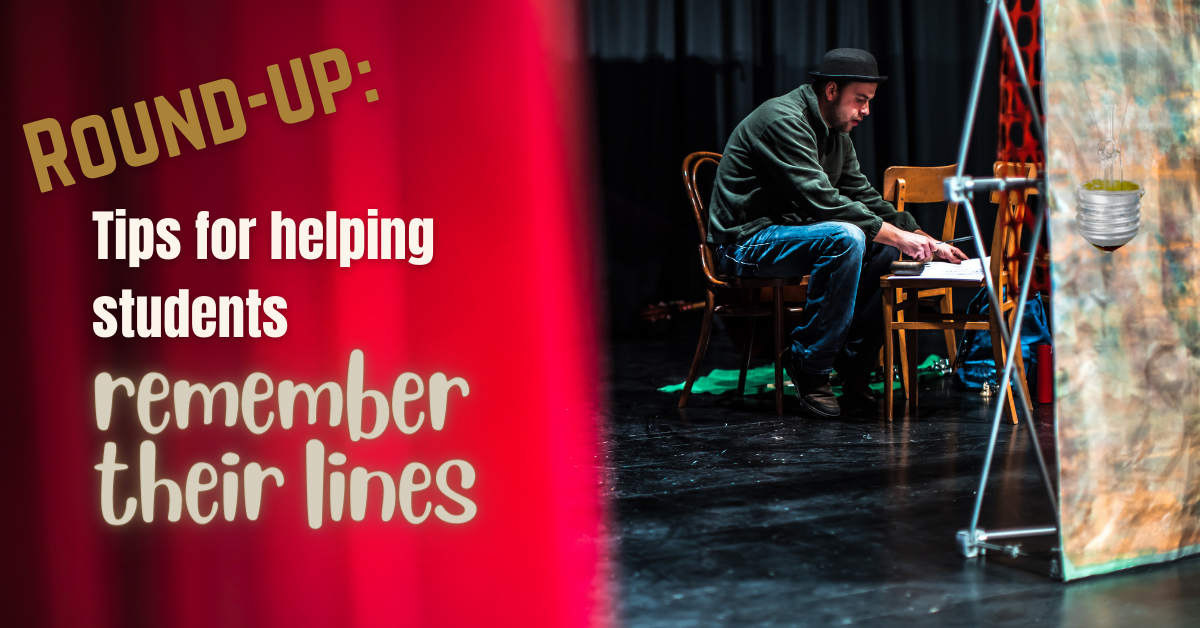What are your tips for helping students remember their lines?
The ability to memorize lines is an essential part of any actor’s toolkit. The better you learn your lines, the more confident you will be on stage. The more confident you are on stage, the better your performance will be.
For some people, memorization comes easily. For others, the struggle is real. So how do you ensure that everyone can master their memorization by opening night?
We went straight to the source to get the inside scoop from those who’ve been there: drama teachers.
We asked: What are your tips for helping students remember their lines?
Divide it up
For me personally, when I am memorizing a monologue or a longer chunk of text, it often helps me to divide up the lines into smaller parts and draw a little cartoon of that thought in the margin of my script. I’m not sure why it works, but a friend of mine did that for me when we were in a show together and I was struggling with a particular part of the script. It made me laugh and somehow the little visual cue helped me remember what came next. I’ve done it for every show since! (Kerry H.)
We have a big table read for the first two days. Then I develop a schedule breaking down scenes that we work on nightly for those first weeks. Break down several page scenes into smaller bits (entrances and exits are useful stopping points). Then I say, “Memorize the first line and the last line and know how to get there. What are the motivations in this scene? Is there desire for something or someone? What is the obstacle keeping them from it?”
We read through the scene once with books in hand and then we go off book. (Linda M.)
Chunk it and hand write them down. You remember what you write, and your hand can’t move quite as fast as your brain, so it gives you that extra second to come up with the next word/line. (Ellen J.)
Provide context
Teach them to learn their lines, not memorize them. Map out each tactic and how it fits with each objective and how they help to overcome each obstacle. Then rehearse, rehearse, rehearse. (Beulah D.)
Know what the lines actually mean. Context and intentions matter. Map out your tactics/choices/ideas with a pencil. Then say your lines to a partner who will help guide you through the text. (Mike M.)
Make sure they understand the circumstances. (Patricia C. La Rose)
I say learn the character and how the character would think. Know why they are saying what they say/what the point is. Once you know that the characters are not reciting lines; they are having conversations. Then learn what they are talking about and how it moves the story forward. Practice it enough and you will say it right. (Nancy K.)
Muscle memory
The Power of 21. Read it 21 times and you will have it memorized. If you want to lock it in forever, write it out (long hand) 21 times. (PTG)
I work time into rehearsals for memorization. I pair them up so they can work with someone they will actually work with rather than be distracted by. (Irene I.)
Sleep with the script by your bed. Last thing you read and first thing you read. Muscle memory. Record it, write it out, score it. And funny voices. Slow mo and speed through. (Meredith L.)
I always tell my students that memorizing lines is just like learning how to sink a free throw or play an instrument. You’ve got to build the muscle memory in your mouth of those words coming out in that specific order. It’s redundant and feels silly but you’ve got to say them. (Brittany M.)
Muscle memory! Associate lines with action — meaningful movement, using props. Also, chunk lines into beginning, middle, and end sections. (Kathi T.)
Get moving
Every time I’ve had to learn a lot of lines quickly, I’ve chosen a bigger space and walked in circles (or blocking) while I read/recited them! Associating movement with the lines helps memorize them. (Joshua C.)
We used to stand in a circle and bounce a tennis ball to the person who spoke next. Everyone had to be focused. Plus the physical act of bouncing a ball helps trigger a memory mechanism. (Blair T.)
Move move move! Walk around and say lines out loud. Use blocking as a trigger for dialogue as well. Associate the movement with the line. (Laura B.)
Singing, walking around, recording the lines and speaking along. (Elke N.)
Use audio/visual cues
Record them and listen to them. They all have earbuds these days. (Tamara M.)
Writing out the first letter of each word! I’ve found it easier to memorize a strand of letters, and then find the circumstances to deepen the text. (Matthew S.)
Have a photographic image of the page in your head. Also a gesture or movement (yours or your cast members’) helps once the scene is blocked. (Paul S.)
Write lines on index cards. I have them write the ones they have the most trouble with. Hand to brain connection is strong. (Wendy B.)
Address different learning styles
How do you study?
If note taking helps, write your lines down.
If you learn best by listening, record your lines and listen to them repeatedly.
If you learn best through movement, run your lines with your blocking. (Carina W.)
Figure out if it’s easiest with visual, kinetic, or audible methods. Test out with games for each. (Ajai T.)
Work out whether they are visual, auditory or kinaesthetic learners. Some learn simply by reading over and over again, covering and checking. We do an audio record early on for those who need to learn it by hearing it, a bit like song lyrics. Others just learn by repetition with action. Try to allow enough time within rehearsal for those who learn best with others. (Polly S.)
To take the pressure off, make sure they know that everyone does it in a different way and that no way is better than another. Help those who are finding it tough and don’t make it the main focus or detract from the joy. (Adrienne F.)
Use technology
Record the scene, leaving appropriate-sized blank spots for your lines. There are phone apps for this. Run it repeatedly. (Duncan T.)
Type or write them out, saying them out loud as you go. Knowing the blocking and stage business helps immensely. The lines are tied with where you are and what you’re doing. (Duncan T.)
Have a rehearsal where they use their phones to record sections of difficult dialogue with the other actors. So, rather than looking at social media when they have a spare minute, they listen to their show. (Kendra K.)
Record yourself with your partner running the scene and listen to it, pausing before your lines and seeing how close you can get to the line. (Gabrielle M.)
I always had my cast use a recording app on their phone to record their lines, their cues, and then record just the cues with time in between to say their lines. (Barry T.)
A few more tips
I tell my kids a rehearsal is not to learn your lines, but the lines of the other cast members.
When you think you are familiar with a scene after reading it over several times, have someone cue you. Then, write down your lines as well as you can remember them. Check for errors. Recording a rehearsal reading and listening over and over helps as well. (Barbara C.)
I like to have them play their character as a superhero or film character of their choice. Everyone is usually laughing by the end of the rehearsal. It takes the pressure off a bit and reminds them that acting is fun. It also seems to distract them from trying too hard to remember. (Jeannette M.)
We do a line test about two weeks in. My kids really sweat the idea of a test so it usually goes pretty well. (Jeremy S.)
I used to find a “glib” rehearsal, where we would run lines, or even the whole show as quickly as possible, would help. Seems to reduce the overthinking and just lets things sort of fall out of your mouth. (Ruth F.)
Look at and read your line a few times and then make eye contact with your scene partner and say as much of the line as you can remember. When you get to a point you can’t remember, look at the line again and repeat it until you get to the end of your line. Then have your partner repeat it. (Gabrielle M.)



